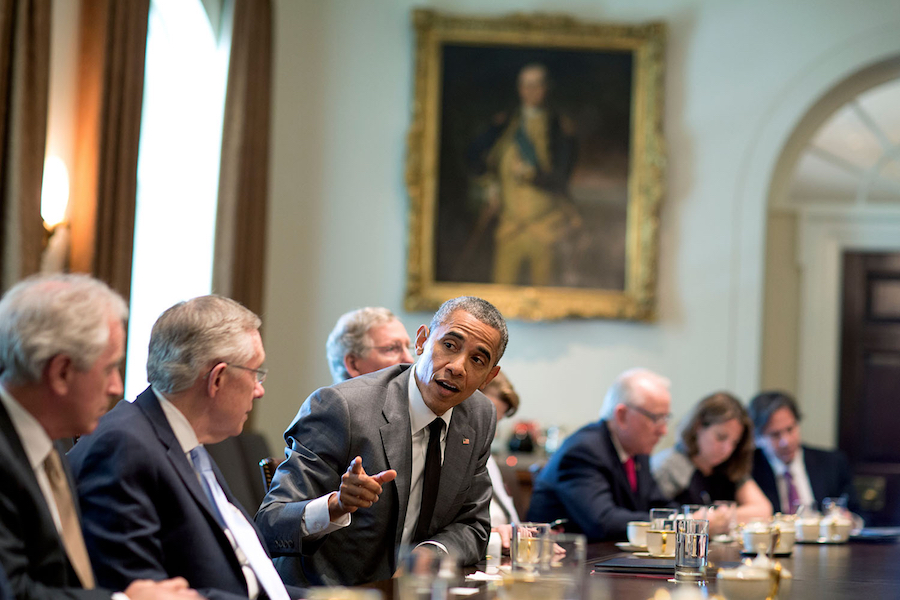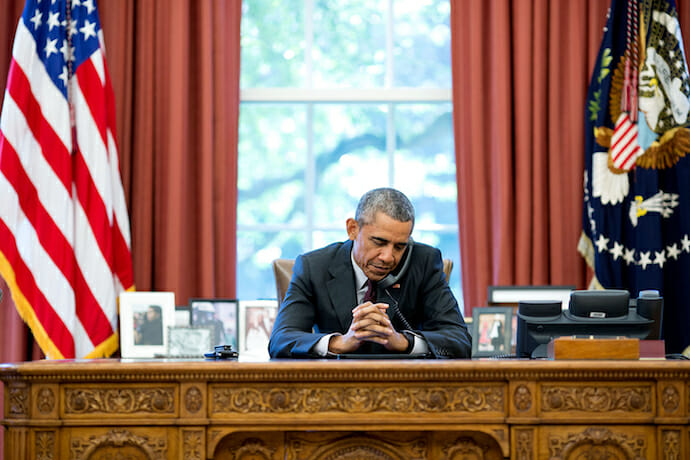
Politics
Obama’s Grand Bargain, GOP’s Last Chance at Tax Reform
Republican lawmakers feeling stung by the last agreement they made with the White House – which saw tax rates rise on the richest Americans – have spurned the White House’s latest offer of a “grand bargain.”
President Obama’s proposal is to concede to lowering the corporate tax rate, closing tax loopholes, and eliminating some deductions, and, in return, the revenue generated would be applied to infrastructure and transportation projects, thus creating jobs for middle-class workers. “I’m willing to work with Republicans on reforming our corporate tax code, as long as we use the money from transitioning to a simpler tax system for a significant investment in creating middle-class jobs,” Obama said in a campaign style event in Chattanooga, Tenn. “That’s the deal.”
The White House’s tone about the debt-ceiling debate has become less conciliatory over the years. In the lead up to the 2011 vote, President Obama argued that the United States has “a system of government in which everybody has to give a little bit.”
Now in his second term and exhausted from a string of domestic and international issues, the White House has declared: “With an endless parade of distractions, political posturing and phony scandals, Washington has taken its eye off the ball. And I am here to say this needs to stop. Short-term thinking and stale debates are not what this moment requires.”
The urgency expressed by both the White House and Congress is that an agreement must be reached on the nation’s debt limit or the United States will default on its obligations and, subsequently, face a shut down. “We’ve been down that road,” Senator Saxby Chambliss (R-GA) said on MSNBC’s “Morning Joe,” in reference to US government’s 1995-96 shut down. “We shut down the government…and we [Republicans] got our butts kicked over shutting down the government.”
Coupled with the sequestration and anemic economic growth, the fear stemming from the Republican leadership is two fold: they could lose control of the House of Representatives in the coming election and they could be blamed for the American economy’s regression, as they were in the 1990s.
While the threat of a government shutdown mortifies more-moderate Republican lawmakers, other Republicans, particularly those associated with the Tea Party Coalition, have declared their support of the agreement on the condition that funding for the Affordable Care Act, or ‘Obamacare,’ is not included. Both inside and outside the beltway conservatives view this opportunity as their best chance at de-funding Obama’s landmark healthcare initiative.

The American people believed the 2011 contest would have led political leaders on both sides to put aside their difference and find an amicable resolution to this seemingly never-ending debate. A further downgrade of the country’s sovereign debt would be detrimental to the country’s sluggish economy and a default all the more frightening; many hope that a compromise will win the day. The Obama administration’s “grand bargain” will be a hard sell to a Congress already ramping up for the 2014 midterm elections while others are positioning themselves for the 2016 presidential contest; it can be expected both events will further increase partisanship in Washington.
There are three facets of the American political system that will undermine a compromise, outright. First, in order for a compromise to be reached enough individuals in both parties need to believe that a default is a reckless endeavor that will have a disastrous impact on the country. Not all Republicans are willing to concede this point as some believe that the debt crisis can be solved solely by cutting domestic spending to payback foreign creditors. Austerity during anemic economic growth is a recipe for market stagnation, as we argued in “In the Midst of Plenty: America’s Struggling Political Economy.”
Second, political leaders on both sides of the aisle need to work harder to not only bridge the gap between the parties, but also unite their constituents. The White House has been struggling with Democrats and Republicans alike with its “grand bargain,” as many Democrats refuse to vote for bills that continue to fund the federal government at the lower rates established under the sequestration. For the Republican leadership, they are concerned that their constituents using the debt-ceiling debate as a bargaining chip to strip away healthcare legislation will mar the party’s image. Most of their castigations have been ignored by the GOP’s more vocal members.
Third, a political party’s perception to the American people is not as important as the way in which it is perceived by its base. Democrat and Republican leaders continually argue in public about swaying independent voters; however, the talking points and posturing is fodder for the parties’ ideological bases. Independent voters may win elections, but the more ideologically driven supporters provide the necessary finances needed to win elections.
The ideological fights that have been growing over the years will continue to undermine the country’s progress. Polarization will destroy any hope for a swift resolution to this – or any other – issue, and the need to be ‘principled’ to the ideologues and interest groups will cause both sides to lose interest in doing the right thing for fear of losing face.
Case in point is Senator Ted Cruz (R-TX) and other tea party Republicans who were swept into office in 2010 largely over the passage of Obamacare. Cruz has found himself at odds with the Republican establishment the moment he was sworn in to office. His latest effort to defund Obamacare has been deemed a losing cause by some of his collogues but he remains committed to his struggle. The Texas freshman lawmaker has even gone so far to argue that a shutdown would not necessarily be a bad thing for the country or the party.
During an event hosted by the Heritage Foundation, Cruz suggested, “I think the received wisdom that ‘95 was a disaster is completely wrong. I think it was important that Republicans stood for principle and it actually led to some serious solutions to the fiscal and economic challenges facing this country.”
The bright spot on Capitol Hill is that Senator Cruz and his band of tea party Republicans are the minority. Senators like Coburn, McCain and others undoubtedly would love to do away entirely with the Affordable Care Act but they realize the political reality is that it will undoubtedly be fully implemented by 2014. Conversely, they realize that a “grand bargain” is their best hope for rewriting corporate tax rates. However, to get to that point each side will have to compromise.


